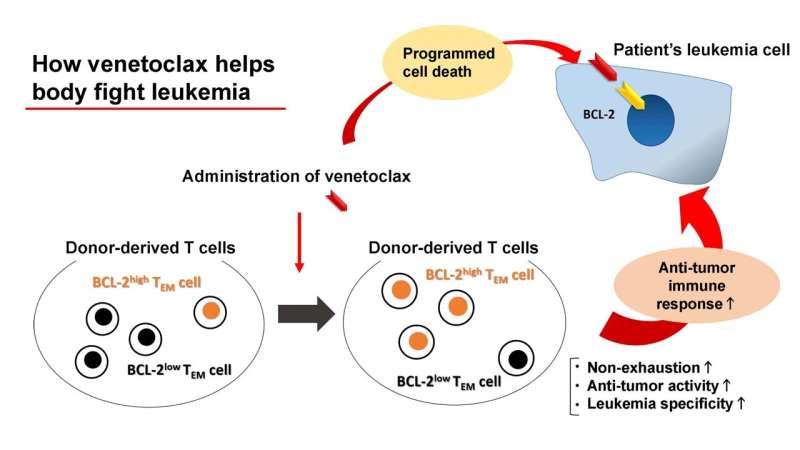This article has been reviewed according to Science X's editorial process and policies. Editors have highlighted the following attributes while ensuring the content's credibility:
fact-checked
peer-reviewed publication
trusted source
proofread
Novel drug application shows improved survival for patients with relapsed and refractory acute myeloid leukemia

Relapsed/refractory acute myeloid leukemia (AML), a blood cancer, has an extremely poor prognosis because of resistance to anti-cancer drugs and frailty of the patient's organ functions. A type of anti-tumor immunotherapy called allogeneic hematopoietic cell transplantation, which can exert anti-cancer effect accompanied by severe toxicity, is often performed for patients who are hard to treat with chemotherapy, but relapse still remains.
The hematopoietic cell transplant team in Osaka Metropolitan University Graduate School of Medicine has developed a novel strategy using a new drug combination, which demonstrated significant anti-cancer effect with mild toxicity for relapsed/refractory AML patients. In addition, the detailed immunological study showed how a new drug induced the enhancement of anti-cancer activity via alterations of immune cells.
In correspondence published in Blood Cancer Journal, the researchers report on their clinical observational study using venetoclax in combination with azacitidine as the treatment for 12 patients with AML who relapsed after allogeneic hematopoietic cell transplantation.
Venetoclax is an oral medication developed by AbbVie and Roche that was approved by the U.S. Food and Drug Administration in October 2020 for AML. It has shown promising results for older patients with untreated AML in promoting the death of cancer cells by inhibiting a regulator protein known as BCL-2.
The OMU researchers' study showed markedly better survival rates after one year for the venetoclax combination therapy group than a control group of 61 patients, at 66.7% to 27.3%. They also showed in the immunological study that the alterations of immune cells induced by venetoclax had enhanced the anti-tumor activity.
"This study demonstrates that novel therapy can improve the prognosis of relapsed/refractory acute myeloid leukemia through both clinical and basic approaches. This therapy can be applied to more patients because of the reduction of the treatment burden," said Dr. Mitsutaka Nishimoto, the corresponding author.
"We hope this will lead to the development of safer, more effective treatments."
More information: Joji Nagasaki et al, T cells with high BCL-2 expression induced by venetoclax impact anti-leukemic immunity "graft-versus-leukemia effects", Blood Cancer Journal (2024). DOI: 10.1038/s41408-024-01064-0



















